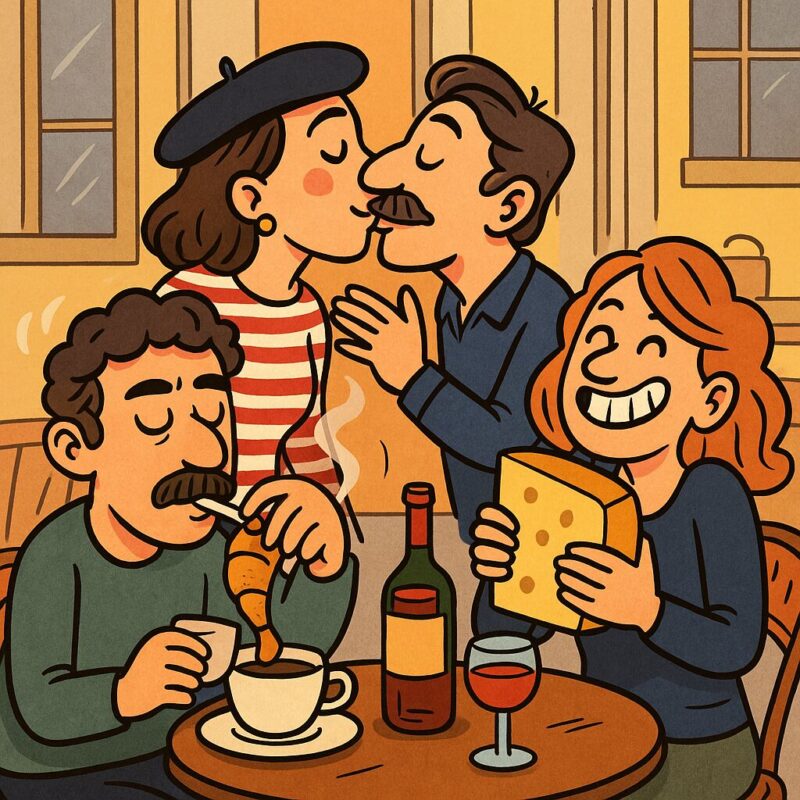13 Most French Things People Do Without Realizing It
French people love pointing out their own quirks, and they do it with zero hesitation. Listen long enough and you’ll hear confession after confession about tiny habits they say without thinking – food rituals, gestures, noises, expressions, and daily reflexes that feel completely normal to them.
Once you spot them, you start catching them everywhere.
The Baguette Reflex
Nothing screams “France” more than someone walking home with a baguette under the arm like it’s a vital organ. Some carry two or three. Some stick them upright in a tote bag like antennas.
And the quignon? That never survives the walk home. People eat it on the spot, as if gravity forces them to. Many say they finish half the bread before reaching the door without even noticing.
The Cheese Logic
Cheese in France isn’t food – it’s infrastructure! Most homes have a small cheese “ecosystem” going at all times: a soft cheese ready to spread, a hard cheese for slicing, a goat cheese for balance, and a blue for the bold.
People talk about cheese as if planning a strategy. They judge weak, tasteless cheeses. They dissect how others cut it. They tease anyone who buys the plasticky supermarket stuff.
If you suggest finishing a meal without cheese, you get stares.
Talking About Food While Eating Food
Meals turn into food storytelling hour. The plate in front of you is only the warm-up. People start remembering a dessert they had last month, an apéro they shared yesterday, or a bakery that “changed their morning.”
The conversation drifts from dish to dish like a relay race. The current meal is rarely the star – it’s only the entry point for discussing the next one.
Dipping Everything Into Morning Coffee
French breakfast culture includes a ritual that confuses outsiders: dipping almost anything into the morning drink.
Croissants take the plunge. Pain au chocolat takes the plunge. Tartine, buttered bread, brioche – all in the mug.
Some go even further and dunk cheese. And the funniest part? Most don’t see anything unusual about it.
Apéro as a Daily Milestone
Apéro isn’t a drink, it’s a moment. People mention it hours ahead. They plan days around it.
Even those who “don’t drink much anymore” somehow appear during apéro with wine, olives, saucisson, and opinions.
It’s a mood reset, a social reset, and often the best part of the day.
The Language of Tiny Noises
French communication comes with a whole library of micro-sounds.
There’s the “hop” for small movements. The “tac” for transitions. The “bah” for hesitation.
The “hein” for checking understanding. The “pfff” for annoyance.
And the lip-pop–shoulder-shrug combo for “I don’t know.”
These aren’t decorations, they’re part of the message.
The Art of the Shrug
The French shrug is its own vocabulary.
A small lift of the shoulders, a tiny pout, maybe a soft “mmh,” and the entire meaning is clear – confusion, disinterest, resignation, amusement.
It’s expressive enough to survive language barriers all on its own.
Complaining as Stress Management
Complaining isn’t negativity, it’s maintenance. A late bus, a noisy scooter, a long queue – each one gets a quick remark. Then life continues.
It’s a release valve so efficient that people do it all day without even noticing.
Fillers That Take Over Conversations
French conversation uses certain expressions like glue. “Du coup” appears constantly.
“Voilà” closes thoughts.
“Oh là là” reacts to anything surprising. “En effet” appears when agreeing politely.
“Ça va” works for greeting, checking, reacting, and ending a call.
These expressions fill silence, shape tone, and smooth transitions.
Morning Rituals Built Around Coffee
Coffee anchors the morning. Some drink it at home, some at a bar counter, some outdoors with a cigarette in hand.
The café-clope duo still defines mornings for many. On sunny days, the ritual extends itself. On cold days too. Pretty much on any day.
Household Expressions That Never Die
“C’est pas Versailles ici” is a national treasure. Lights left on? It works. Doors left open? Works again. Too much heating? Still works.
Children hear it for years, repeat it as adults, and pass it on without realising they’ve become their parents.
Emotional Reactions to Good Bread
The smell of fresh bread in front of a bakery stops people mid-walk.
They comment on it. They admire it. They sigh.
Even abroad, they hunt for the closest bakery and judge it instantly. If the bread is soft, panic begins. If it’s good, relief spreads through the group.
Insults With Style and Personality
Insults are woven into everyday speech. They’re colourful, exaggerated, and often delivered with a tone that makes them sound more comic than aggressive.
A simple story gets funnier when a well-placed insult appears. Everyone knows exactly when to add one.

